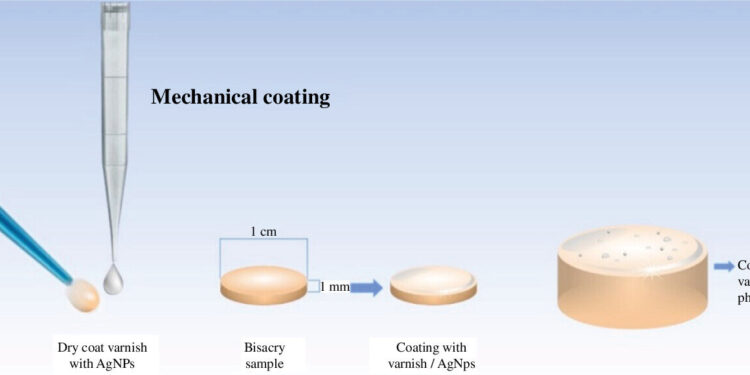Deposition of silver nanoparticles onto repair resin using mechanical coating for amicrobial biofilm inhibition. Credit: Dr Ravichandran Manisekaran
The oral cavity is home to a rich ecosystem of microorganisms present in both healthy and diseased states. In the field of dental restoration, highly specialized materials are used to perform specific functions so that the patient recovers their dental structures, masticatory and phonetic functions and even benefits from improved aesthetics.
These materials allow commensal microorganisms to adhere and grow on rough surfaces, forming biofilms resistant to the oral environment and hygienic conditions. So, over time, these bacteria can corrode the material, create changes in structure and color, and even cause infections, such as gingivitis or denture stomatitis. Therefore, the addition of self-hygienic properties to prevent microbial colonization is necessary to maintain the oral ecosystem.
Silver nanoparticles (AgNPs) are widely used in research for their antimicrobial, optical and electrical properties, and are widely used in cosmetic, biomedical, packaging and other industries.
In research recently published in Royal Society Open ScienceResearchers from the Interdisciplinary Research Laboratory (LII) of ENES Leon, UNAM, have designed a method to incorporate AgNPs on the surface of composite resins used for temporary dental restorations in order to inhibit the bacterial growth of early colonizers in the oral cavity.
“Our method inhibits biofilm formation by allowing silver to remain on the surface of the resin for a long time with sustained release of silver ions, without affecting the fibroblastic cells evaluated in this study and provides antiseptic activity in provisional restorations like bisacrylic resin,” says Verónica Campos-Ibarra, postdoctoral researcher at ENES Leon, UNAM and professor at the School of Stomatology, UASLP of San Luis Potosí.
Ravichandran Manisekaran, research professor and coordinator of the Nanostructures and Biomaterials Laboratory, said the researchers used a mechanical coating method with a concentration of <0.03% silver without the need for additional equipment other than that used in practice clinical.
This innovative investigation focused on prosthetic materials that are part of a collaborative work between ENES and UASLP, which contributes to the development of nanostructure-modified medical devices focused on infection prevention by screening biomedical materials currently available. These materials help reduce treatment costs and reduce infections, thereby improving the patient’s quality of life.
This story is part of Science X Dialog, where researchers can report the results of their published research articles. Visit this page for more information about Science X Dialog and how to get involved.
More information:
Verónica Campos-Ibarra et al, Silver nanoparticles incorporated into a dental restoration resin and its antibiofilm effect, Royal Society Open Science (2024). DOI: 10.1098/rsos.240915
Dr. Ravichandran Manisekaran is a research professor working at ENES, Leon-UNAM. His research focuses on the design of materials based on nanostructures for biomedical applications.
Quote: Scientists design self-hygienic resin based on silver nanoparticles for use in dental applications (October 3, 2024) retrieved October 3, 2024 from
This document is subject to copyright. Except for fair use for private study or research purposes, no part may be reproduced without written permission. The content is provided for informational purposes only.



